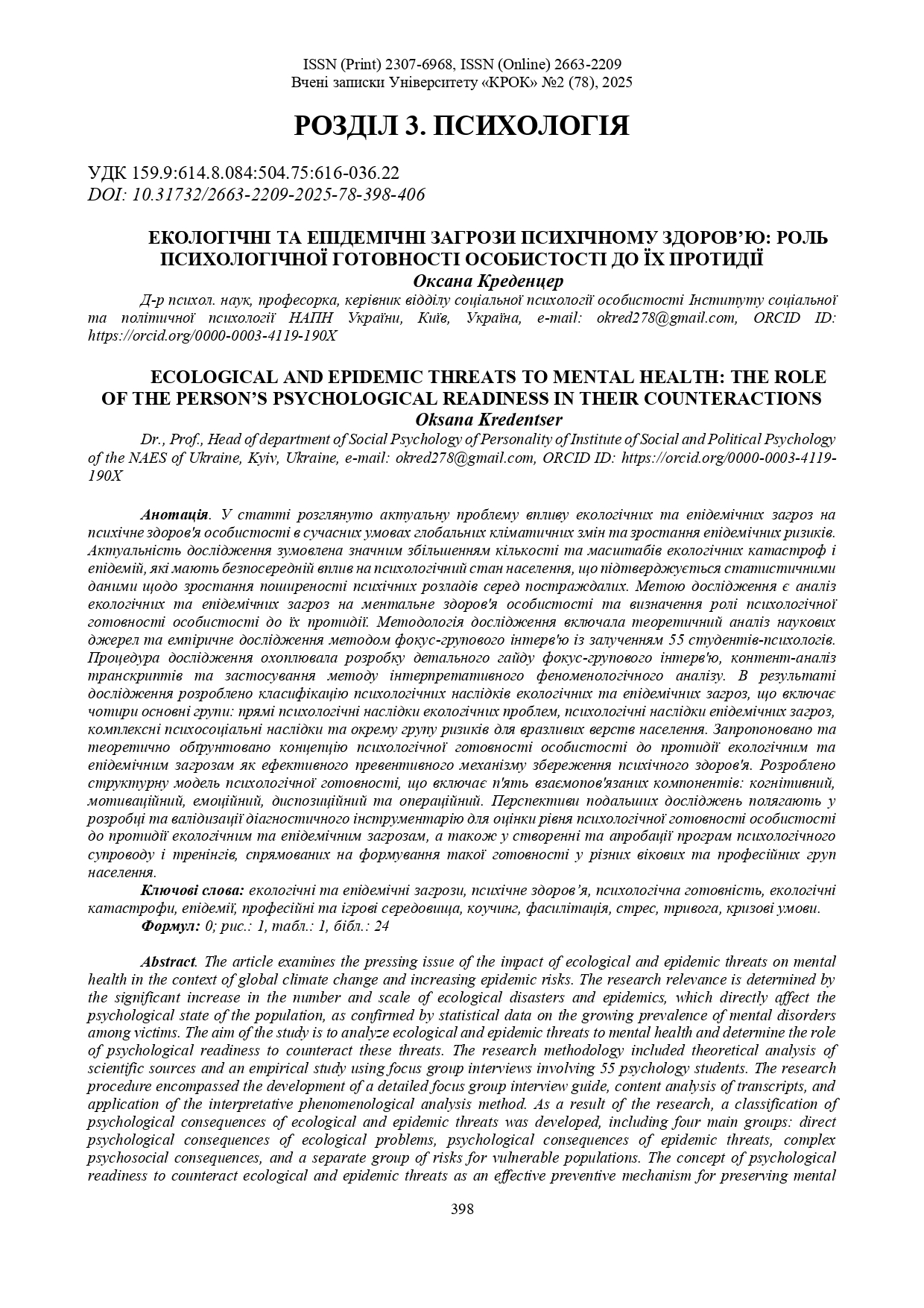ЕКОЛОГІЧНІ ТА ЕПІДЕМІЧНІ ЗАГРОЗИ ПСИХІЧНОМУ ЗДОРОВ’Ю: РОЛЬ ПСИХОЛОГІЧНОЇ ГОТОВНОСТІ ОСОБИСТОСТІ ДО ЇХ ПРОТИДІЇ
DOI:
https://doi.org/10.31732/2663-2209-2025-78-398-406Ключові слова:
екологічні та епідемічні загрози, психічне здоров’я, психологічна готовність, екологічні катастрофи, епідемії, професійні та ігрові середовища, коучинг, фасилітація, стрес, тривога, кризові умовиАнотація
У статті розглянуто актуальну проблему впливу екологічних та епідемічних загроз на психічне здоров'я особистості в сучасних умовах глобальних кліматичних змін та зростання епідемічних ризиків. Актуальність дослідження зумовлена значним збільшенням кількості та масштабів екологічних катастроф і епідемій, які мають безпосередній вплив на психологічний стан населення, що підтверджується статистичними даними щодо зростання поширеності психічних розладів серед постраждалих. Метою дослідження є аналіз екологічних та епідемічних загроз на ментальне здоров'я особистості та визначення ролі психологічної готовності особистості до їх протидії. Методологія дослідження включала теоретичний аналіз наукових джерел та емпіричне дослідження методом фокус-групового інтерв'ю із залученням 55 студентів-психологів. Процедура дослідження охоплювала розробку детального гайду фокус-групового інтерв'ю, контент-аналіз транскриптів та застосування методу інтерпретативного феноменологічного аналізу. В результаті дослідження розроблено класифікацію психологічних наслідків екологічних та епідемічних загроз, що включає чотири основні групи: прямі психологічні наслідки екологічних проблем, психологічні наслідки епідемічних загроз, комплексні психосоціальні наслідки та окрему групу ризиків для вразливих верств населення. Запропоновано та теоретично обґрунтовано концепцію психологічної готовності особистості до протидії екологічним та епідемічним загрозам як ефективного превентивного механізму збереження психічного здоров'я. Розроблено структурну модель психологічної готовності, що включає п'ять взаємопов'язаних компонентів: когнітивний, мотиваційний, емоційний, диспозиційний та операційний. Перспективи подальших досліджень полягають у розробці та валідизації діагностичного інструментарію для оцінки рівня психологічної готовності особистості до протидії екологічним та епідемічним загрозам, а також у створенні та апробації програм психологічного супроводу і тренінгів, спрямованих на формування такої готовності у різних вікових та професійних груп населення.
Завантаження
Посилання
Карамушка, Л. М. (Ред.) (2008). Технологія психологічної підготовки персоналу організацій до роботи в умовах соціально-економічних змін: навч. посіб. Науковий світ.
Карамушка, Л. М., Креденцер, О. В., Терещенко, К. В., та ін. (2021). Психолого-організаційні детермінанти забезпечення психологічного здоров’я персоналу освітніх організацій в умовах соціальної напруженості: монографія. Л. М. Карамушка (Ред.). Видавець Вікторія Кундельська.
Карамушка, Л. М., Креденцер, О. В., Терещенко, К. В., та ін. (2024). Технології забезпечення психічного здоров’я та благополуччя освітнього персоналу в умовах війни та післявоєнного відновлення. Л. М. Карамушка (Ред.). Інститут психології імені Г.С. Костюка НАПН України. https://lib.iitta.gov.ua/id/eprint/741857/
Корольчук, М. С., & Крайнюк, В. М. (2006). Соціально-психологічне забезпечення діяльності в звичайних та екстремальних умовах. Ніка-центр.
Кряж, І. В., & Баєва, К. О. (2020). Роль екологічної світоглядної позиції в подоланні проблем, спричинених глобальними змінами навколишнього середовища. Вісник Харківського національного університету імені В. Н. Каразіна. Серія Психологія , (69), 64–73. https://doi.org/10.26565/2225-7756-2020-69-09
Міністерство захисту довкілля та природних ресурсів України. (2024). Вплив війни на довкілля. https://mepr.gov.ua/rosijsko-ukrayinska-vijna-vplyv-na-dovkillya-u-kyyevi-predstavyly-druge-vydannya-doslidzhennya-pro-ekologichni-naslidky-vijny/
Моляко, В. О. (2018). Психологічні проблеми конструювання образу світу (загальні положення робочої концепції). Актуальні проблеми психології: Збірник наукових праць Інституту психології імені Г. С. Костюка НАПН України, 14(1), 5–18.
Павлік, Ю. (2019). Екологічний ризик як складна соціальна ситуація: динаміка конструювання проблеми. Наукові студії соціальної та політичної психології , 25(1), 158–165.
Скребець, В. О., & Шлімакова, І. І. (2014). Екологічна психологія: підручник. Видавничий дім «Слово».
Слюсаревський, М. М. (Ред.), Найдьонова, Л. А. (Ред.), & Вознесенська, О. Л. (Ред.) (2020). Досвід переживання пандемії COVID-19: дистанційні психологічні дослідження, дистанційна психологічна підтримка: матеріали онлайн-семінарів. ІСПП НАПН України.
Юрченко, Л., Хорошев, О., Логовський, І., & Ващук, Т. (2023). Соціально-психологічна реабілітація в екологічній площині. Проблеми екстремальної та кризової психології 2(6), 171–181.
Albrecht, G., Sartore, G. M., Connor, L., Higginbotham, N., Freeman, S., Kelly, B., Stain, H., Tonna, A., & Pollard, G. (2007). Solastalgia: The distress caused by environmental change. Australasian Psychiatry, 15(1), 95–98. https://doi.org/10.1080/10398560701701288
Bosello, F., Nicholls, R.J., Richards, J. et al. (2012). Economic impacts of climate change in Europe: sea-level rise. Climatic Change, 112, 63–81. https://doi.org/10.1007/s10584-011-0340-1
Cáceres, C., Leiva-Bianchi, M., Serrano, C., Ormazábal, Y., Mena, C., & Cantillana, J. C. (2022). What Is Solastalgia and How Is It Measured? SOS, a Validated Scale in Population Exposed to Drought and Forest Fires. International journal of environmental research and public health, 19(20), 13682. https://doi.org/10.3390/ijerph192013682
Cénat, J. M., et al. (2021). Prevalence of symptoms of depression, anxiety, insomnia, posttraumatic stress disorder, and psychological distress among populations affected by the COVID-19 pandemic: A systematic review and meta-analysis. Psychiatry research, 295, 113599. https://doi.org/10.1016/j.psychres.2020.113599
Clayton, S. (2020). Climate anxiety: Psychological responses to climate change. Journal of Anxiety Disorders, 74, 102263. https://doi.org/10.1016/j.janxdis.2020.102263
Clayton, S., Manning, C., Krygsman, K., & Speiser, M. (2017). Mental health and our changing climate: Impacts, implications, and guidance. American Psychological Association, and ecoAmerica.
Fernandez A, Black J, Jones M, Wilson L, Salvador-Carulla L, Astell-Burt T, et al. (2015) Flooding and Mental Health: A Systematic Mapping Review. PLoS ONE 10(4): e0119929. https://doi.org/10.1371/journal.pone.0119929
Foudi, S., Osés-Eraso, N., & Galarraga, I. (2017). The effect of flooding on mental health: Lessons learned for building resilience, Water Resour. Res., 53, 5831–5844, doi:10.1002/2017WR020435.
Garfin, D. R., Silver, R. C., & Holman, E. A. (2020). The novel coronavirus (COVID-2019) outbreak: Amplification of public health consequences by media exposure. Health Psychology, 39(5), 355–357. https://doi.org/10.1037/hea0000875
Hartig, T., Mitchell, R., de Vries, S., & Frumkin, H. (2014). Nature and health. Annual Review of Public Health, 35, 207–228. https://doi.org/10.1146/annurev-publhealth-032013-182443
Serafini, G., Parmigiani, B., Amerio, A., Aguglia, A., Sher, L., & Amore, M. (2020). The psychological impact of COVID-19 on the mental health in the general population. International Journal of Medicine, 8, 531–537. https://doi.org/10.1093/qjmed/hcaa201
Taylor, S. (2019). The psychology of pandemics: Preparing for the next global outbreak of infectious disease. Cambridge Scholars Publishing.
WWF "Living Planet Report" (2024). https://www.worldwildlife.org/publications/2024-living-planet-report

Downloads
Опубліковано
Як цитувати
Номер
Розділ
Ліцензія

Ця робота ліцензується відповідно до Creative Commons Attribution-NonCommercial 4.0 International License.

